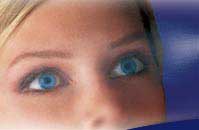New Study Confirms that Staring at a Computer Screen Alters Tear Film Content, Causes Dry Eye
Sharon Kleyne Hour Power of Water Radio Host has Been Teaching about Computers and Dry Eye for Years, Feels Vindicated
Eye doctors have long known that staring at a computer screen for hours can cause the all-important basal tear film in the eyes to lose water and become dehydrated. A new study, recently reported in Salon.com* suggests that staring at a computer screen can also alter the tear film's chemical structure. Kleyne has been teaching her audience about computers, the tear film and dry eye for years and regards the new findings as an affirmation.
|
FREE SHIP OFFER ENDS 04/28/24 COUPON CODE LP891 CLICK HERE NOW TO SAVE |

|
(*Gray, Sarah, "Staring at Screen is Altering Your Tears, Study Finds," Salon, September 15, 2014
http://www.salon.com/2014/09/15/staring_at_a_screen_is_altering_your_tears_study_finds/)
Sharon Kleyne hosts the syndicated Sharon Kleyne Hour Power of Water radio show, heard on VoiceAmerica and Apple iTunes. The show is sponsored by Bio-Logic Aqua Research, a global research and technology center specializing in fresh water, the atmosphere and dehydration. Nature's Tears® EyeMist® is the Research Center's signature product for dry eyes. Kleyne is Bio-Logic Aqua's Founder and Research Director.
In the radio show's seven year history, Kleyne notes, her guest interviews have included many of the nation's leading eye doctors. Every one has observed a strong correlation between extended computer use and dry eye symptoms.
When one stares at a computer screen, or any other screen, according to Kleyne, the eye's reflexive blink rate can drop by as much a 90%. The purpose of blinking is to spread new tears over the exposed cornea and sclera. The tear film, although highly complex, is 99% water and the longer the time period between blinks, the more likely it becomes that some of the water will evaporate into the atmosphere.
A drop in water content by as little as two percent, says Kleyne, can trigger dry eye symptoms such as blurred vision, headaches, eye discomfort, and increased feelings of stress. When the tear film loses water, the brain senses an injury and starts placing inflammation causing hormone in the tear film mix. The inflammatory hormone is in itself dehydrating, resulting in a vicious circle of evaporation and inflammation that can be difficult to break.
The new study reported in Salon.com, which took place in Japan, found that dehydration of the tear film also decreases production of a substance called :"mucin AC5." The tear film's mucin content causes tears to adhere to the ocular surface rather than bead up. As with inflammatory hormone, a drop in mucin content is in itself dehydrating and can worsen the dry eye condition.
Kleyne offers several tips to avoid computer dry eye. Most important, eyes should be well hydrated before the computer session and the computer room should not contain high factors for dry eye, such as fluorescent lighting or heating and cooling vents blowing directly at you.
To hydrate eyes while not using the computer, Kleyne suggests drinking eight glasses of water a day, in addition to other fluid intake. Drink rather than sip the water and drink two full glasses upon rising. Children should drink half their body weight in ounces per day, so a 50 pound child should drink 25 ounces of water per day.
Kleyne also recommends keeping a couple windows slightly open in winter - especially in the bathroom - to let in fresh air. Other home suggestions: House plants and bowls of water will raise a room's humidity and placing baffles over forced-air vents will prevent them from blowing directly onto the face and eyes. Frequent baths are also beneficial.
While using the computer, says Kleyne, take frequent breaks that include getting up and walking around, and look away from the computer every few minutes. Reducing screen glare also helps, as does positioning the chair so that operator is looking slightly down at the screen.
According to Kleyne, the Bio-Logic Aqua Research product, Nature's Tears® EyeMist® is specifically designed to supplement tear film moisture lost as a result of excessive computer use and dry eye symptoms.
Sharon Kleyne History |
Sharon Kleyne Discover More |
|
Sharon Kleyne Press Release |
Sharon Kleyne Health Tips |








